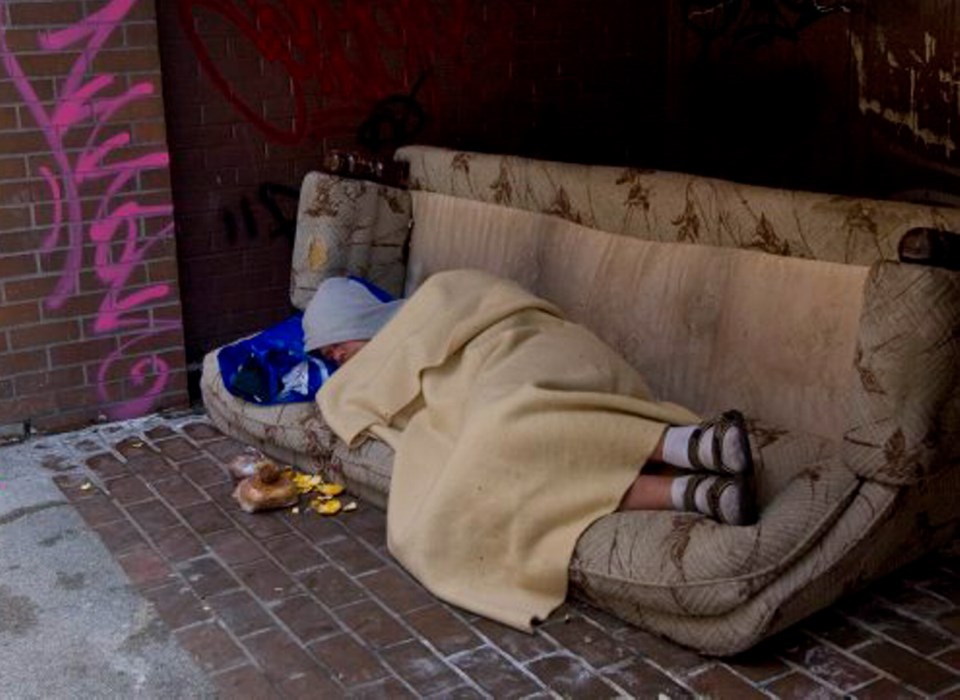This hasn’t been the best summer for the homeless. Last week, property owners in a residential section of London installed what have been dubbed “anti-homeless studs” in alcoves to deter “rough sleeping.”
The thick metal prongs (they’re too sharp to be called “studs” and too dull to be called “spikes,” but either way, I sure wouldn’t want to sleep on them) have been harshly condemned by Twitter users, some of whom observed the parallels between the studs and those anti-pigeon spikes that are used in major cities to chase away vermin.
And if that weren’t enough, over the past few months, 33 cities in the U.S. have attempted (or are in the process of attempting) to ban sharing food with the homeless. Like, what? Food is a basic human need — surely this is taking us into Evil Villain territory.
Yet another city — Fort Lauderdale, Fla. — is considering legislation that will make it illegal to display one’s personal possessions on public property, effectively stripping homeless people of their right to own, well, anything, since the default setting of homelessness is the state of not having reliable access to private property.
None of this is about trying to fix the conditions that create poverty. It’s not about ending homelessness for the sake of homeless people. Nobody is erecting spikes and fining charitable do-gooders in an attempt to “help,” although the “it’s for their own good” argument has been on many commenters’ lips.
That’s false on the face of it: It’s about making homelessness less annoying for the non-homeless.
Victorians live in a city where homelessness is extremely visible, both in our conversations and in our public spaces. This is especially true in the summer, as city employees and business owners get antsy about the impact of homelessness on tourism.
And to a certain degree, I guess I get it. Homelessness can be ugly. Homelessness means being confronted by people who are — for one reason or another — living in a way that we hope we never have to. Walking up Yates or Pandora, we see the concrete of our sidewalks stained with urine or worse.
In Victoria in the summer, homelessness means a panhandler on every corner of Government Street, competing for space with locals and tourists and people trying to get to work and buskers trying to eke out their own zones.
The effects of homelessness are inconvenient for us. Homelessness can be ugly and smelly and gross, and it gets in our way when we’re trying to go about our business. Many of us feel vaguely guilty about the reminder that we have more and others have less. We want that reminder to go away. So yeah, that sucks.
But let’s not for a minute pretend that this mild kind of everyday inconvenience operates on anywhere near the level of inconvenience that actually being homeless does.
I think this reality often gets lost.
People who are homeless often don’t know where they will find shelter on a given night, where their food or income will come from that day, or what relationships they can rely on for emotional or psychological support. Those are serious problems to deal with. Me? All I need is an Americano in the morning — my other basic, human, essential needs are taken care of.
As someone who has dipped in and out of retail over the past decade, I’ve witnessed a number of sales-centric conversations about homelessness that boil down to: “I want these people gone.” In this world, homeless people are automatically an impediment at best, a loss-prevention threat at worst.
Do I like the idea of a homeless person choosing to sleep under my building’s awning?
I won’t pretend I do. As a young woman, I’m keenly aware of the safety threat it poses; there are certain streets I don’t walk down past a certain hour of the day, because of the people you find there.
It’s crucial to observe, however, that these people are more likely to be victims of violence than perpetrators of it. In almost all cases, surely a person’s human right to warmth, safety and housing (none of which are properly met by an outdoor awning anyway) trumps our irritation with the mild problems that homelessness causes in our own privileged lives. Surely?



